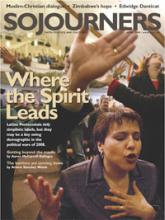More than seven years ago, James Carroll, award-winning novelist and Boston Globe columnist, wrote Constantine’s Sword, which traced the history of anti-Semitism in the church and also included Carroll’s personal reflections on his life as the son of an Air Force general and as a former priest. Carroll’s book asserted that the rejection and suppression of Jews was a key facet of Christian theology, adopted at the time of the Emperor Constantine’s victory over his enemies in 312 and his subsequent promotion of the Christian faith. It was at that time that Con– stantine’s war-making was coupled with Christianity and both were infused with anti-Semitism.
Carroll’s significant research and reflection into this critical matter have been updated in a new documentary, also titled Constantine’s Sword, directed by Oren Jacoby. One of the film’s central themes, the historical connection between Western armies and Christian faith, is exemplified by the allegations of coercive tactics by evangelical chaplains, cadets, and staff at the U.S. Air Force Academy in Colorado Springs, which were publicized in 2005.
Carroll interviews people on both sides of the academy scandal, but the film’s sympathy lies with those who found the overt evangelization disturbing, intolerant, and offensive. Those on the other side tend to minimize the issue or refuse to recognize that blatant proselytizing is unacceptable at a government facility, and instead claim protection through the tenet of free speech.
Read the Full Article
